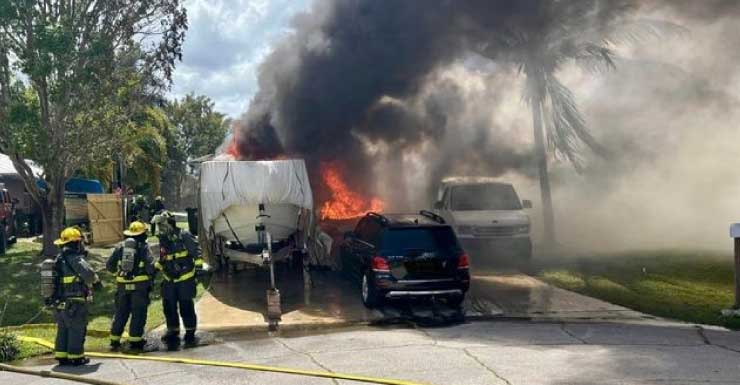18 Fla. L. Weekly Supp. 341a
Online Reference: FLWSUPP 1804DUPR
Insurance — Personal injury protection — Summary judgment — Opposing affidavit — Error to decline to consider affidavit and peer review report prepared by insurer’s expert and filed in opposition to summary judgment on grounds that insurer did not obtain report before denial of claim and report was not based on independent medical examination — Discovery — Depositions — No error in awarding expert witness fees for deposition of treating physician where insurer entered into agreed order granting fees
UNITED AUTOMOBILE INSURANCE COMPANY, Appellant, vs. AFFILIATED HEALTHCARE CENTERS a/a/o AMIE DUPREY, Appellee. Circuit Court, 11th Judicial Circuit (Appellate) in and for Miami-Dade County. Case No. 09-066 AP and 09-521 AP (Consolidated). L.T. Case No. 2007009767CC25. February 9, 2011. On appeal from a decision of the County Court for Miami-Dade. Counsel: Michael J. Neimand, United Automobile Insurance Company, Office of the General Counsel, for Appellant. Chelin V. Sampedro, for Appellee.
(Before RODRIGUEZ, SCHUMACHER, and FIRTEL, JJ.)
(RODRIGUEZ, Judge.) The instant cause of action is for recovery of personal injury protection benefits (“PIP”) as provided for in the Florida Motor Vehicle No-Fault Act, Sections 627.730-627.7405, Florida Statutes. Ms. Duprey, the insured, was involved in a motor vehicle accident on May 25, 2006. United Automobile Insurance Company (“United Auto”) insured the vehicle driven by Ms. Duprey. Thereafter, Ms. Duprey sought medical care and treatment from Affiliated Healthcare Centers, Inc., (“Affiliated Healthcare”) where she incurred medical expenses. Affiliated Healthcare timely submitted its bills to United Auto. However, United Auto failed to make payment.
On April 30, 2007, Affiliated Healthcare, the assignee of PIP benefits from the insured, Ms. Duprey, filed a complaint against the insurer for breach of contract, for an accident that occurred May 25, 2006. On June 18, 2007, United Auto filed its answer and affirmative defenses.
On December 5, 2007, Affiliated Healthcare filed a motion for summary judgment on the grounds that all treatment was reasonable, related, and necessary. In support, the affidavit of Dr. Burak, the treating physician, was filed. The affidavit stated that all of the treatment that was rendered between August 31, 2006 through November 22, 2006 was reasonable, related and necessary.
On November 26, 2008, in opposition to the motion for summary judgment, United Auto filed Dr. Merrit’s Affidavit and Peer Review Report which was obtained on May 30, 2008. Dr. Merritt then executed an affidavit on November 19, 2008. Id. The affidavit concluded:
In reviewing all of the submitted clinical records, it is this reviewer’s opinion that chiropractic treatment . . . [at Affiliated Healthcare] was not reasonable, related or medically necessary as it pertains to the motor vehicle accident of 5/25/06. This represents a change in the reviewer’s opinion and is based on the review of the additional clinical records.
Dr. Merrit’s affidavit modified his initial peer review report due to his review of additional medical records. Though the initial peer review report of May 30, 2008, found some of the treatment at Affiliated Healthcare reasonable, related and necessary, his affidavit concluded that none of the treatment was warranted.
After hearing argument, the trial court determined that the peer review was not a valid report because it was untimely, and there was no independent medical examination (“IME”) conducted of the patient. Thus, the trial court declined to consider Dr. Merrit’s affidavit since his peer review was obtained after the lawsuit was filed and it was not based on an IME. The trial court granted Affiliated Healthcare’s motion for summary judgment, finding the treatment was related and medically necessary.
Prior to the final judgment, United Auto sought to depose the treating physician, Dr. Burak, without paying an expert witness fee. United Auto contended that a treating physician is a fact witness, not an expert witness, and therefore not entitled to expert fees. Affiliated Healthcare filed a motion for protective order seeking an expert witness fee prior to the deposition. The trial court granted the motion for protective order, over United Auto’s objection. The parties then entered an agreed order granting expert witness fees to the treating physician at the rate of $350.00 per hour for his deposition.
On October 28, 2008, a final judgment was entered. United Auto subsequently appealed to this Court.
Summary Judgment On the Issue of Reasonable, Related, and Necessary
This Court’s standard of review for a grant of summary judgment is de novo. Volusia County v. Aberdeen at Ormond Beach, L.P., 760 So. 2d 126, 126 (Fla. 2000) [25 Fla. L. Weekly S390a]. A party moving for summary judgment must show conclusively the absence of any genuine issue of material fact, and the court must draw every possible inference in favor of the non-moving party. McKenna v. Camino Real Village Assoc., Inc., 877 So. 2d 900, 900 (Fla. 4th DCA 2004) [29 Fla. L. Weekly D1681a]. If the evidence raises any issue of material fact, or if it is conflicting, it should be submitted to the trier of fact as a question of fact to be determined. Id. at 900-01.
The trial court did not consider United Auto’s peer review affidavit because it was not based on an IME, and the peer review report was not first obtained prior to the denial of the claim. However, since the filing of the appeal, the Third District has ruled that a peer review report need not be based on an IME. See United Auto. v. Metro Injury Rehab Ctr., a/a/o Magda Davis 16 So. 3d 897 (Fla. 3d DCA July 29, 2009) [34 Fla. L. Weekly D1516a]; Partners in Health Chiropractic v. United Auto. Ins. Co., 21 So. 3d 858 (Fla. 3d DCA 2009) [34 Fla. L. Weekly D2177a]; United Auto. Ins. Co. v. Comprehensive Health Ctr., LLC,26 So. 3d 49 (Fla. 3d DCA 2009) [35 Fla. L. Weekly D51b]. The case law holds that pursuant to section 627.736(7)(a), Florida Statutes (2009), a valid report may be based on a physical examination conducted by the treating physician and does not require an additional examination by the reporting physician or an examination conducted on the insurer’s behalf. See Partners in Health, 21 So. 3d at 864.
As well, the Third District has ruled that it is not necessary to obtain a medical report prior to the denial of a claim. See United Auto. Ins. Co. v. Santa Fe Med. Ctr. a/a/o Telmo Lopez, 34 Fla. L. Weekly D2051[b] (Fla. 3d DCA Oct. 7, 2009). Thus, case law precedent requires this Court to reverse the trial court’s grant of summary judgment.
Expert Witness Fees
United Auto sought to depose the treating physician without paying an expert witness fee. Affiliated contended that since the treating physician was an expert, he was entitled to expert witness fees. The trial court agreed and awarded such fees. The parties subsequently agreed to a joint order granting the fees.
United Auto now contends that the trial court incorrectly granted an expert witness fee to Dr. Burak, as the treating physician in the instant case. Florida Rule of Civil Procedure 1.390 governs depositions of expert witnesses. It states in part:
(a) Definition: The term “expert witness” as used herein applies exclusively to a person duly and regularly engaged in the practice of a profession who holds a professional degree from a university or college and has had special professional training and experience or one possessed of special knowledge of skill about the subject upon which called to testify.
(b) Fee. An expert or skilled witness whose deposition is taken shall be allowed a witness fee in such reasonable amount as the court may determine. The court shall also determine a reasonable time within which payment must be made, if the deponent and party cannot agree. All parties and the deponent shall be served with notice of any hearing to determine the fee. Any reasonable fee paid to an expert or skilled witness may be taxed as costs.
Affiliated Healthcare asserts that Dr. Burak fits within this definition provided by the Florida Legislature, and therefore was properly compensated for his deposition testimony. The definition does not distinguish between a treating expert and an expert acquired to render an opinion for litigation. Forest Hill Injury Ctr. v. Bristol West Ins. Co. 15 Fla. L. Weekly Supp. 1122c (Fla. 15th Cir. Palm Beach, County Court, Sept. 23, 2008).
However, United Auto cites Fittipaldi USA, Inc., v. Castroneves, 905 So. 2d 182 (Fla. 3d DCA 2005) [30 Fla. L. Weekly D867a] for the premise that treating physicians are not owed expert fees. In Fittipaldi, a sports management company sued a former client for breach of contract. Id. at 184. The former client called its attorney as a witness. Id. The sports management company alleged that the attorney was not designated as an expert witness and thus the company was unduly prejudiced where the court allowed the attorney to testify as an expert. Id. at 185. In determining whether the attorney’s testimony should have been excluded as expert testimony, the Third District found that the attorney was a fact witness where he testified as to the course of action taken by the attorney witness on behalf of the party. Id. Nonetheless, testimony regarding the legal quality of the party’s prior agreements was regarded as expert testimony. Id. Therefore, the Third District found that the trial court should have excluded such testimony where the attorney was not listed as an expert witness. Id. at 186.
However, in Fittipaldi, the Third District expressly found that “. . . [i]t is entirely possible that even a treating physician’s testimony could cross the line into expert testimony.” Id. at 186. By way of illustration, the Third District stated:
. . . we find that the contested portions of Miller’s testimony were not similar to the testimony of “treating physicians” and, in any event, were well outside the parameters of ordinary witness testimony. For example, as a trained attorney advising a client on the termination of a legal agreement, it cannot be said that Miller did not acquire his expert knowledge for the purpose or in anticipation of litigation.
Id. at 186.
Thus, the Third District allows expert witness fees for treating physicians, when they are called upon to provide testimony which ventures beyond discussing their medical performance in a particular instance. See id.
Affiliated Healthcare argues that in the instant case that United Auto sought to elicit opinions from Dr. Burak. Further, it states that the questions ventured beyond his interrogation as an actor or viewer testifying to facts which are the subject matter of the lawsuit. Accordingly, Affiliated Healthcare contends that Dr. Burak’s testimony should be compensated in the manner prescribed by Rule 1.390, Florida Rules of Civil Procedure.
In contrast, United Auto asserts that in the instant case Dr. Burak was deposed for the purpose of discovering Dr. Burak’s course of treatment of the insured, rather than to obtain opinions on the medical performance of another physician or other subjects. Therefore, under the reasoning in Fittipaldi, United Auto argues that Dr. Burak must be treated as an ordinary fact witness, rather than an expert witness entitled to an expert witness fee for his deposition. See Fittipaldi, 905 So. 2d at 185.
Nevertheless, despite the dispute between United Auto and Affiliated Healthcare as to whether Dr. Burak was merely a fact witness, the parties entered into an agreed order granting expert witness fees to the treating physician.1 Thus, while United Auto protests that the order was made over its objection, it nonetheless consented. Therefore, the Court does not have a basis to conclude that the testimony of Dr. Burak was not expert in nature, as contemplated by recent case law. Id. at 186.
Attorney’s Fees Awarded at Trial
Once Affiliated Healthcare obtained summary judgment, it sought attorney’s fees. The trial court subsequently granted the fees. However, United Auto asserts that if the Court reverses the underlying judgment, then the grant of statutory attorney’s fees must be reversed as well.
United Auto argues that the fee judgment must be reversed because Affiliated Healthcare’s entitlement to fees and costs is premised on section 627.428(1), Florida Statutes, which requires the entry of a judgment against an insurer and in favor of the insured or a beneficiary. Case law unequivocally interprets statutes providing for attorney’s fees to require the reversal of fee award, if the underlying judgment is reversed. See; Nevarez v. Friskney, 819 So. 2d 992, 993 (Fla. 5th DCA 2002) [27 Fla. L. Weekly D1506a]; Marty v. Bainter, 727 So. 2d 1124, 1125 (Fla. 1st DCA 1999) [24 Fla. L. Weekly D695a]; Nathanson v. Houss, 717 So. 2d 114, 115 (Fla. 4th DCA 1998) [23 Fla. L. Weekly D2094b].
Affiliated Healthcare’s Motion for Appellee Attorney’s Fees
Affiliated Healthcare’s Motion for attorney’s fees pursuant to section 627.428, Florida Statutes, remains outstanding, to be determined, pending the resolution of the instant case in the trial court.
Based on the foregoing, this case is REMANDED to the trial court. The lower court’s decision granting summary judgment on the issue of reasonable, related, and necessary is REVERSED; the lower court’s decision granting expert witness fees is AFFIRMED; the lower court’s decision granting of statutory based attorney’s fees is REVERSED. The Apelles’s attorney’s fees remains outstanding, pending the County Court’s ultimate decision on the case. (SCHUMACHER and FIRTEL, JJ. concur.)
__________________
1The order is entitled “Agreed Order Regarding Treating Physician Expert Witness Fee.”




 how can I help you?
how can I help you?